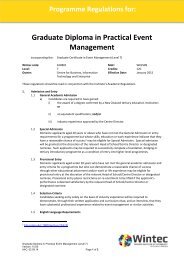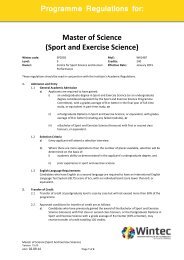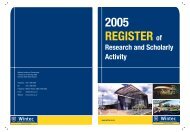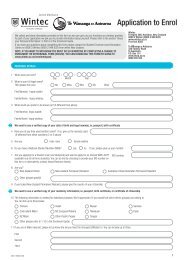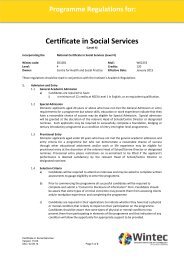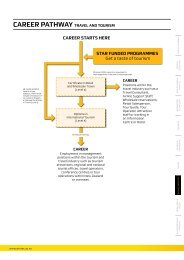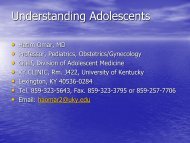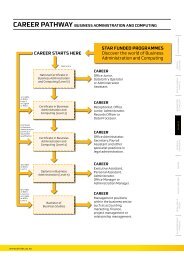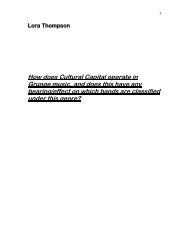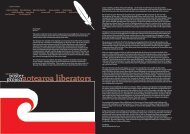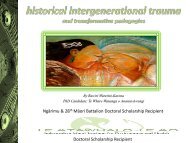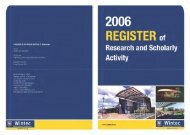Principles and Procedures: Conducting Research in a ... - Wintec
Principles and Procedures: Conducting Research in a ... - Wintec
Principles and Procedures: Conducting Research in a ... - Wintec
Create successful ePaper yourself
Turn your PDF publications into a flip-book with our unique Google optimized e-Paper software.
AB9 - 7/00 (B)<br />
<strong>Pr<strong>in</strong>ciples</strong> <strong>and</strong><br />
<strong>Procedures</strong>:<br />
<strong>Conduct<strong>in</strong>g</strong><br />
<strong>Research</strong> <strong>in</strong> a<br />
Maori Context<br />
Category: <strong>Research</strong> Policy Number: AB9 - 7/00 (B)<br />
Title: <strong>Conduct<strong>in</strong>g</strong> <strong>Research</strong> <strong>in</strong> a Maori Context Date Approved: 1999<br />
Prepared by: <strong>Research</strong> Office Date of Last Revision April 2010<br />
Authorised by: Academic Board New Review Date: April 2013
Section A – <strong>Pr<strong>in</strong>ciples</strong> <strong>and</strong> <strong>Procedures</strong><br />
1.0 Treaty of Waitangi<br />
1.1 Implications for <strong>Research</strong>ers (Department of Psychology, 1997 <strong>and</strong> Health<br />
<strong>Research</strong> Council of NZ, 1998).<br />
Waikato Institute of Technology (W<strong>in</strong>tec) is committed <strong>in</strong> terms of its<br />
Charter to the spirit <strong>and</strong> <strong>in</strong>tent of the Treaty of Waitangi. This <strong>in</strong>cludes<br />
the retention of Maori control (t<strong>in</strong>o rangatiratanga) over Maori resources,<br />
<strong>in</strong>clud<strong>in</strong>g people.<br />
Moreover, an approach consistent with the Treaty of Waitangi means<br />
that research conducted by staff or students of the Institution will honour<br />
the pr<strong>in</strong>ciples of partnership, participation <strong>and</strong> protection:<br />
1.1.1 Partnership (derived from Article 1): Where Maori are major<br />
participants <strong>in</strong> research or they have a major stake <strong>in</strong> the outcome of a<br />
research project focussed on an issue of relevance to Maori, then<br />
work<strong>in</strong>g relationships based on collaboration <strong>and</strong> partnership should be<br />
established, between the researcher <strong>and</strong> these participants. This would<br />
<strong>in</strong>clude the mutual shar<strong>in</strong>g of research skills <strong>and</strong> research outcomes.<br />
1.1.2 Protection (derived from Article 2): The researcher must ensure the<br />
protection of Maori participants <strong>and</strong> Maori resources <strong>in</strong> the research<br />
process, <strong>in</strong>clud<strong>in</strong>g as far as possible protection from any negative impact<br />
that might result from the f<strong>in</strong>d<strong>in</strong>gs of the project be<strong>in</strong>g made public. This<br />
may <strong>in</strong>clude plac<strong>in</strong>g a moratorium on the research material for an agreed<br />
period of time or on keep<strong>in</strong>g confidential certa<strong>in</strong> material.<br />
Protection goes beyond the requirement to obta<strong>in</strong> <strong>in</strong>formed consent from<br />
the participant. As a general rule, consultation should occur if Maori are<br />
to be <strong>in</strong>volved as participants <strong>in</strong> a project or the research project relates<br />
to an issue of importance to Maori. This consultation should also <strong>in</strong>volve<br />
guid<strong>in</strong>g the researcher to what needs to be protected <strong>and</strong> how this<br />
protection can be effected.<br />
Generally, most research questions posed <strong>in</strong> the social sciences with<strong>in</strong><br />
New Zeal<strong>and</strong> are likely to <strong>in</strong>clude Maori participants, unless the research<br />
is restricted on the basis of species (i.e. <strong>in</strong>volves non-human subjects),<br />
ethnicity or cultural group.<br />
Accord<strong>in</strong>gly researchers should anticipate Maori <strong>in</strong>volvement as<br />
participants <strong>and</strong> ensure that research protocols uphold the pr<strong>in</strong>ciples of<br />
protection, partnership <strong>and</strong> participation.<br />
In order to determ<strong>in</strong>e whether Maori have an <strong>in</strong>terest <strong>in</strong> the research<br />
question, consultation with appropriate Maori persons should occur <strong>in</strong> the<br />
early plann<strong>in</strong>g stages of the research.<br />
Waikato Institute of Technology<br />
AB9 – 7/00 (B)<br />
Page 2 of 10
1.1.3 Participation (derived from Article 3): As with all citizens, Maori have a<br />
right to participate <strong>in</strong> <strong>and</strong> enjoy society's benefits <strong>in</strong>clud<strong>in</strong>g those that<br />
might result from research, <strong>and</strong> Maori <strong>in</strong>volvement <strong>in</strong> this research.<br />
The rationale for <strong>in</strong>clud<strong>in</strong>g, or exclud<strong>in</strong>g, Maori participants <strong>in</strong> a research<br />
project, needs to be made clear. <strong>Research</strong> should empower the<br />
community <strong>in</strong>volved <strong>and</strong> exclud<strong>in</strong>g Maori from a research project might<br />
simply serve to marg<strong>in</strong>alise them further. However, a major section of<br />
the New Zeal<strong>and</strong> population has been excluded from the research<br />
thereby limit<strong>in</strong>g the generalisation of the results.<br />
If there are no justifiable reasons for exclud<strong>in</strong>g Maori from participat<strong>in</strong>g <strong>in</strong><br />
a research project, then suitable steps should be taken to ensure<br />
appropriate <strong>in</strong>clusion.<br />
2.0 Protocols / <strong>Pr<strong>in</strong>ciples</strong> for <strong>Conduct<strong>in</strong>g</strong> <strong>Research</strong> <strong>in</strong> a Maori Context<br />
2.1 Ethics<br />
Waikato Institute of Technology<br />
The follow<strong>in</strong>g pr<strong>in</strong>ciples/protocols are to be addressed by any researcher<br />
at W<strong>in</strong>tec who conducts Maori focussed research:<br />
2.1.1 The consent of the people <strong>in</strong>volved <strong>in</strong> the research, where such people<br />
are identifiable, will be sought <strong>and</strong> confirmed before the research<br />
commences as well as on an ongo<strong>in</strong>g basis. Where there are no<br />
identifiable persons or groups, then a Maori mentor/consultation group<br />
will be established for areas where public <strong>in</strong>formation/knowledge is cited.<br />
With regard to <strong>in</strong>formed consent the researcher will need to establish<br />
who speaks for the community/Iwi <strong>and</strong> what the conditions of the<br />
<strong>in</strong>formed consent will be. Appropriate <strong>in</strong>stitutional advice will be made<br />
available to guide the consultation process.<br />
2.1.2 The aims of the research <strong>in</strong>vestigation as well as the anticipated<br />
outcome(s) of such an <strong>in</strong>vestigation will be conveyed to the people<br />
<strong>in</strong>volved <strong>in</strong> the research <strong>in</strong> a clear, concise <strong>and</strong> appropriate way.<br />
2.1.3 The rights, <strong>in</strong>terests <strong>and</strong> sensitivities of the people be<strong>in</strong>g researched will<br />
be acknowledged <strong>and</strong> protected, <strong>in</strong>clud<strong>in</strong>g the protection of any<br />
<strong>in</strong>tellectual property rights such as those perta<strong>in</strong><strong>in</strong>g to traditional Maori<br />
medic<strong>in</strong>es.<br />
2.1.4 <strong>Research</strong> tools <strong>and</strong> techniques which are open, direct <strong>and</strong> transparent<br />
should be used at all times, <strong>and</strong> secret or covert work will not be<br />
acceptable, except <strong>in</strong> very exceptional circumstances. All participants<br />
will be fully <strong>in</strong>formed that they are <strong>in</strong>volved <strong>in</strong> a research study before<br />
the study beg<strong>in</strong>s.<br />
2.1.5 The people be<strong>in</strong>g studied have control over the results of the research<br />
process <strong>and</strong> as such have an absolute right to exercise control over the<br />
<strong>in</strong>formation they have volunteered. This <strong>in</strong>cludes the right to control it, to<br />
restrict access to it, or to withdraw part or all of the <strong>in</strong>formation from the<br />
AB9 – 7/00 (B)<br />
Page 3 of 10
actual research project f<strong>in</strong>d<strong>in</strong>gs. It is the researcher's responsibility to<br />
clarify with research participants how this control might be exercised.<br />
2.1.6 The researcher(s) must honestly <strong>and</strong> accurately represent their skills<br />
<strong>and</strong> experience to those <strong>in</strong>volved <strong>in</strong> the research.<br />
2.1.7 <strong>Research</strong>ers will not exploit <strong>in</strong>formants, or the <strong>in</strong>formation gathered from<br />
the research, for personal ga<strong>in</strong> or aggr<strong>and</strong>isement. Where possible <strong>and</strong><br />
appropriate, fair return should be given for participants' help <strong>and</strong><br />
services, which should be acknowledged <strong>in</strong> the f<strong>in</strong>al output.<br />
2.1.8 The people <strong>in</strong>volved <strong>in</strong> the research activities will have the right to<br />
appeal to the research mentors <strong>in</strong> the event of any problems aris<strong>in</strong>g <strong>in</strong><br />
the research process. These mentors will be clearly identified before the<br />
research commences.<br />
2.1.9 All the ethical pr<strong>in</strong>ciples outl<strong>in</strong>ed <strong>in</strong> the Human Ethics <strong>in</strong> <strong>Research</strong> Policy<br />
(GAA 9-43/96) will be adhered to <strong>in</strong> this policy, <strong>in</strong>clud<strong>in</strong>g the right of<br />
research participants to rema<strong>in</strong> anonymous.<br />
2.1.10 An important aspect of the question of ethics is values. Maori values<br />
must be acknowledged by <strong>in</strong>corporation with<strong>in</strong> the research design <strong>and</strong><br />
methodology of a project. These values are such th<strong>in</strong>gs as: (refer to<br />
Section B – 1.0).<br />
Mana Maori. Ensure that mana Maori is upheld at all times.<br />
Tikanga/Kawa Maori. Ensure that appropriate aspects of tikanga<br />
Maori are understood, acknowledged <strong>and</strong> upheld.<br />
Te kawa o te marae. Strictly upheld <strong>and</strong> observed.<br />
Tapu <strong>and</strong> noa. Ensure there are no conflicts of tapu <strong>and</strong> noa.<br />
Whakawhanaungatanga. This process runs throughout the project<br />
when <strong>and</strong> where appropriate.<br />
2.1.11 All <strong>in</strong>dividuals or groups <strong>in</strong>volved <strong>in</strong> the research process will be given,<br />
at least, an executive summary of this policy/protocol.<br />
2.2. Accountability<br />
2.2.1 The researchers' ma<strong>in</strong> responsibility <strong>and</strong> accountability will be to the<br />
people <strong>in</strong>volved <strong>in</strong> the activities be<strong>in</strong>g researched, who will be<br />
considered as hav<strong>in</strong>g an equal <strong>in</strong>terest <strong>in</strong> the project.<br />
2.2.2 The people be<strong>in</strong>g studied have an absolute right to know as far as can<br />
be anticipated what will become of the <strong>in</strong>formation they have volunteered<br />
as well as its possible use <strong>and</strong> application.<br />
2.2.3 <strong>Research</strong>ers must be will<strong>in</strong>g at the outset of research projects to<br />
recognise that the results <strong>and</strong> outcomes of any research contributed by<br />
any <strong>in</strong>dividual or group will be presented to them <strong>in</strong> draft form for edit<strong>in</strong>g<br />
before any form of distribution or publication, ie they will have the right of<br />
veto or censure over their contribution.<br />
Waikato Institute of Technology<br />
AB9 – 7/00 (B)<br />
Page 4 of 10
2.2.4 The contribution of any <strong>in</strong>dividual or group consulted will be<br />
acknowledged <strong>in</strong> the f<strong>in</strong>al research report, except that all <strong>in</strong>dividuals or<br />
groups tak<strong>in</strong>g part <strong>in</strong> the research have a right to rema<strong>in</strong> anonymous.<br />
2.3 Participatory Approach<br />
2.3.1 The terms of the research as well as the research question <strong>and</strong><br />
methodology will be designed <strong>in</strong> consultation with, <strong>and</strong> hav<strong>in</strong>g due<br />
consideration for, the expertise of the Maori <strong>in</strong>dividuals or groups who<br />
will form part of the research.<br />
2.3.2 Cont<strong>in</strong>ual monitor<strong>in</strong>g of the research process will be shared equally by<br />
the researcher <strong>and</strong> the <strong>in</strong>dividual or group provid<strong>in</strong>g the <strong>in</strong>formation.<br />
2.3.3 Integral to successful participatory research is the development of a true<br />
research partnership based on trust <strong>and</strong> one which does not prejudice<br />
the <strong>in</strong>terest of any one partner mak<strong>in</strong>g up the partnership.<br />
2.3.4 As part of collaborative processes the research <strong>in</strong>itiator will take<br />
responsibility for shar<strong>in</strong>g <strong>and</strong> co-develop<strong>in</strong>g research skills with research<br />
participants.<br />
2.4 Intellectual Property Rights of the <strong>Research</strong><br />
In the <strong>in</strong>itial consultation stage it will be necessary to establish where the<br />
ownership of the end result of the research will reside - with the<br />
researcher, the researcher's <strong>in</strong>stitution, the sponsor(s), fund<strong>in</strong>g agency,<br />
the local community or another organisation.<br />
There is a cross reference to the Institution’s Intellectual Property Policy<br />
once this has been approved by the Executive.<br />
2.5 <strong>Research</strong> Outcomes<br />
2.5.1 The research will make a positive contribution to Maori needs, aims <strong>and</strong><br />
aspirations as def<strong>in</strong>ed by Maori <strong>and</strong> the enhancement of mana. It is the<br />
researcher's responsibility to ensure that Maori participants are clear<br />
about the aim of the research.<br />
2.5.2 The f<strong>in</strong>d<strong>in</strong>gs of the research will be presented <strong>in</strong> a format that is readily<br />
underst<strong>and</strong>able <strong>and</strong> accessible to all stakeholders, <strong>and</strong> particularly to<br />
those who provide the basis for the research f<strong>in</strong>d<strong>in</strong>gs. Where<br />
appropriate, the research f<strong>in</strong>d<strong>in</strong>gs will be presented <strong>in</strong> oral, written <strong>and</strong><br />
visual forms <strong>in</strong> both Maori <strong>and</strong> non-Maori publications <strong>and</strong> forums.<br />
2.5.3 A summary of the f<strong>in</strong>al research report will be made available to any<br />
<strong>in</strong>dividual or group who provided <strong>in</strong>formation used <strong>in</strong> the f<strong>in</strong>al research<br />
report. A full report of the research will be held <strong>in</strong> the library of Witnec.<br />
In the case of an artwork <strong>and</strong> creative works, participat<strong>in</strong>g <strong>in</strong>dividuals or<br />
groups will be advised where it can be viewed.<br />
Refer to Part A (Policy)<br />
Waikato Institute of Technology<br />
AB9 – 7/00 (B)<br />
Page 5 of 10
Section B – Associated Information<br />
1.0 Def<strong>in</strong>itions<br />
2.0 References<br />
Mana Maori – Prestige, authority or dignity<br />
Tikanga Maori – Maori method or custom. Encompass<strong>in</strong>g th<strong>in</strong>gs or<br />
ways pert<strong>in</strong>ent to an authentic Maori view or lifestyle<br />
Te Kawa O Te Marae – etiquette <strong>and</strong> protocol associated with marae<br />
proceed<strong>in</strong>gs <strong>and</strong> meet<strong>in</strong>gs<br />
Tapu – state of religious restriction or ‘mana of spiritual powers’ 1 . Sacred<br />
(modern) 2<br />
Noa – free from tapu. Ord<strong>in</strong>ary<br />
Whakawhanaungatanga – ongo<strong>in</strong>g process of form<strong>in</strong>g <strong>and</strong> ma<strong>in</strong>ta<strong>in</strong><strong>in</strong>g<br />
relationships, often through geneological l<strong>in</strong>ks<br />
<br />
<br />
<br />
<br />
<br />
<br />
<br />
<br />
Bishop, R. 1996. Collaborative <strong>Research</strong> Stories:<br />
Whakawhanaungatanga.<br />
Durie, A. 1992. Whaia Te Ara Tika: <strong>Research</strong> Methodologies <strong>and</strong><br />
Maori<br />
Health <strong>Research</strong> Council of New Zeal<strong>and</strong>. 1998. Guidel<strong>in</strong>es for<br />
<strong>Research</strong>ers on Health <strong>Research</strong> Involv<strong>in</strong>g Maori.<br />
Department of Psychology, Waikato University. 1997. Psychology<br />
Department's Ethical Review Guidel<strong>in</strong>es: The Treaty of Waitangi<br />
Smith, L. 1992. Te Rapunga I Te Ao Marama: The search for the<br />
World of Light. In The issue of <strong>Research</strong> <strong>and</strong> Maori. Monograph<br />
No.9, <strong>Research</strong> Unit for Maori Education, University of Auckl<strong>and</strong>,<br />
August 1992.<br />
Smith, L. 1996. Kaupapa Maori <strong>Research</strong>. Report of Hui<br />
Whakapiripiri<br />
Taurima, W. & Cash, M. 1998. Learn<strong>in</strong>g about Maori Bus<strong>in</strong>ess:<br />
Draft Protocol For Cultural Learn<strong>in</strong>g Exchange<br />
Teariki, C., Spoonley, P., Tomoana, N. 1992. Te Whakapakari Te<br />
Mana Tangata. The Politics <strong>and</strong> Process of <strong>Research</strong> for Maori.<br />
1 Shirres, Michael P. Tapu (Te Runanga o te Hahi Katorika ki Aotearoa: Ponsonby, N.Z., 1994) p5.<br />
2 Williams, H. W. Dictionary of the Maori language, 7th ed. (GP Publications: Well<strong>in</strong>gton, 1992)p. 385.<br />
Waikato Institute of Technology<br />
AB9 – 7/00 (B)<br />
Page 6 of 10
Section C - Processes<br />
Appendix A<br />
Checklist for the Structure of the <strong>Research</strong> Project<br />
PRELIMINARIES<br />
Yes No N/A<br />
Iwi <strong>and</strong> stakeholders have been identified <br />
Reasons for consult<strong>in</strong>g have been clarified <br />
<br />
Objectives <strong>in</strong> outcomes have been specified <br />
<br />
The most appropriate methods <strong>and</strong> types of consultation<br />
to achieve the outcomes have been selected <br />
<br />
Costs have been calculated <strong>and</strong> available funds identified <br />
The Human Ethics <strong>in</strong> <strong>Research</strong> Committee has processed the<br />
<strong>Research</strong> proposal <br />
Adequate lead-time for all participants to the consultative<br />
process is ensured <br />
<br />
<br />
<br />
PREPARATION<br />
Iwi <strong>and</strong> stakeholder groups are consulted <strong>and</strong> <strong>in</strong>vited to participate <br />
<br />
Costs are discussed <strong>and</strong> negotiated eg paid expertise <strong>and</strong> koha <br />
<br />
Agreement is reached on an agenda <strong>and</strong> facilities needed to achieve<br />
objectives, <strong>in</strong>clud<strong>in</strong>g documentation, presentation speakers,<br />
venue, time <strong>and</strong> date, equipment <strong>and</strong> record<strong>in</strong>g of <strong>in</strong>put <br />
<br />
Tasks <strong>and</strong> timel<strong>in</strong>es are listed <br />
<br />
Responsibilities are allocated <br />
<br />
Invitations are dispatched with plenty of time for participants to<br />
prepare themselves <br />
<br />
Feedback mechanisms <strong>and</strong> post-consultation strategies are agreed <br />
Any tra<strong>in</strong><strong>in</strong>g <strong>and</strong>/or additional development needs of Iwi <strong>and</strong> stakeholder<br />
groups is identified <br />
Waikato Institute of Technology<br />
AB9 – 7/00 (B)<br />
Page 7 of 10
THE FACE-TO-FACE COLLABORATION<br />
All necessary material is readily available <strong>and</strong> distributed <br />
Effort is made to ensure that research methods are understood <br />
All reports, workshop proceed<strong>in</strong>gs, tapes <strong>and</strong> records are collected<br />
for subsequent process<strong>in</strong>g <br />
<br />
Follow-up methods are decided <strong>and</strong> agreed upon <br />
<br />
Any disagreements or issues have been addressed <br />
Feedback mechanisms are agreed <br />
<br />
<br />
POST-PARTICIPATION<br />
Consultation m<strong>in</strong>utes <strong>and</strong> reports are f<strong>in</strong>alised <br />
<br />
Consultation is evaluated by organis<strong>in</strong>g Committee <br />
<br />
Feedback is provided to all concerned accord<strong>in</strong>g to agreed mechanisms <br />
<br />
Future improvements are planned <strong>in</strong> light of experience <strong>and</strong> evaluations <br />
Feedback from consultations is followed up <br />
<br />
Cont<strong>in</strong>ual feedback occurs <strong>in</strong>clud<strong>in</strong>g explanations about why some<br />
community aspirations cannot be met <br />
<br />
Waikato Institute of Technology<br />
AB9 – 7/00 (B)<br />
Page 8 of 10
Appendix B<br />
Summary of Treaty of Waitangi implications on different research processes <strong>in</strong> Aotearoa/New Zeal<strong>and</strong><br />
1. Fundamental non applied<br />
(e.g; develop<strong>in</strong>g computer<br />
data programme)<br />
2. Applied research with only<br />
general <strong>in</strong>terest to Mäori<br />
(e.g; Global climate change)<br />
Partnership Protection Participation<br />
If Mäori participate (normal case),<br />
make sure that the research<br />
procedure is culturally sensitive<br />
(safe).<br />
<strong>Research</strong> f<strong>in</strong>d<strong>in</strong>gs should be<br />
accessible to Mäori.<br />
As above. To avoid assum<strong>in</strong>g<br />
that Mäori have only general<br />
<strong>in</strong>terest <strong>in</strong> your research question,<br />
consultation with Kaumätua,<br />
Mäori rep on Ethics Committee or<br />
Mäori staff or Mäori advisory<br />
committee.<br />
As above. Mäori participants <strong>and</strong><br />
resources should be protected<br />
from any negative impact.<br />
A r<strong>and</strong>om sample of participants<br />
should normally <strong>in</strong>volve Mäori.<br />
As above. You need to justify<br />
your method of recruit<strong>in</strong>g<br />
participants if it is not actively<br />
<strong>in</strong>clud<strong>in</strong>g Mäori.<br />
3. <strong>Research</strong> with special<br />
<strong>in</strong>terest to Mäori (e.g.,<br />
mental health (high<br />
<strong>in</strong>cidence); Mäori design)<br />
A work<strong>in</strong>g relationship with Mäori<br />
based on collaboration <strong>and</strong><br />
partnership should be<br />
established. Make sure that<br />
research f<strong>in</strong>d<strong>in</strong>gs are actively<br />
dissem<strong>in</strong>ated to Mäori.<br />
All above. Make sure that Mäori<br />
advice <strong>and</strong> collaboration is<br />
appropriately acknowledged <strong>and</strong><br />
compensated.<br />
The development of the method<br />
of recruit<strong>in</strong>g participants needs to<br />
be done <strong>in</strong> collaboration with<br />
Mäori. Opportunity for Mäori to<br />
participate <strong>and</strong> contribute at all<br />
stages of the research processes<br />
should be maximised.<br />
4. <strong>Research</strong> questions<br />
directly focuss<strong>in</strong>g on Mäori<br />
concerns (e.g; What social<br />
support function do Mäori<br />
whanau provide their<br />
members? Mäori retention<br />
rates?)<br />
As <strong>in</strong> 3 above, but Mäori role<br />
needs to be extended to active<br />
research partnership which plays<br />
an important role <strong>in</strong> any research<br />
management decisions.<br />
All above. Make sure that Mäori<br />
advisors are protected from be<strong>in</strong>g<br />
burdened with unreasonable<br />
requests or expectations.<br />
As <strong>in</strong> 3. above.<br />
Reference: Reproduced from Department of Psychology. (1997). Ethical Review Guidel<strong>in</strong>es Hamilton. University of Waikato



